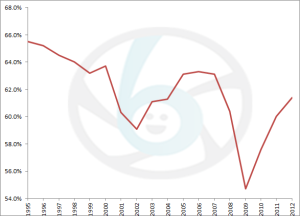Crowdsourcing an Efficient Market
Public hotel chains including Hilton, Marriott, and Wyndham are now implementing franchise growth strategies to ramp up a pipeline of new hotels and rooms in response to the strong recovery in the travel industry.
This recovery has been underway since 2009.

Industry disruptors like Airbnb and HomeAway spent the last five years eating the hotel industry’s lunch while hotel chains were still loading their muskets.
Construction takes time, and hotels can’t move that quickly. Crowdsourcing provides a highly-liquid, dynamic supply. Travelers don’t have to wait half a decade for Airbnb hosts to build new rooms to meet their needs. In times of low demand, hosts take their rooms off the market while hotel chains go through bankruptcy and consolidation.

People have made noise about Uber’s surge pricing and Lyft’s Prime Time price increases, but this is how the principle of supply and demand works. How much would someone have to pay you to schlep passengers on New Years’ Eve? Or in the aftermath of a hurricane?
By providing higher incentive to drivers during times when they would probably rather be doing other stuff, supply increases to match the number of passengers needing rides. With a potentially limitless source of drivers, we quickly find an efficient market.
Regulations that cap prices or artificially limit supply enforce an inefficient market where supply and demand never meet.
Cities like San Francisco and NYC are finally issuing more taxi medallions for the first time in years. At the same time, GDP data show that prices for traveler accommodations are falling, and we’ll soon see a glut of empty hotel rooms. It’s hard to create an efficient market when moving at Gatling-gun pace.

